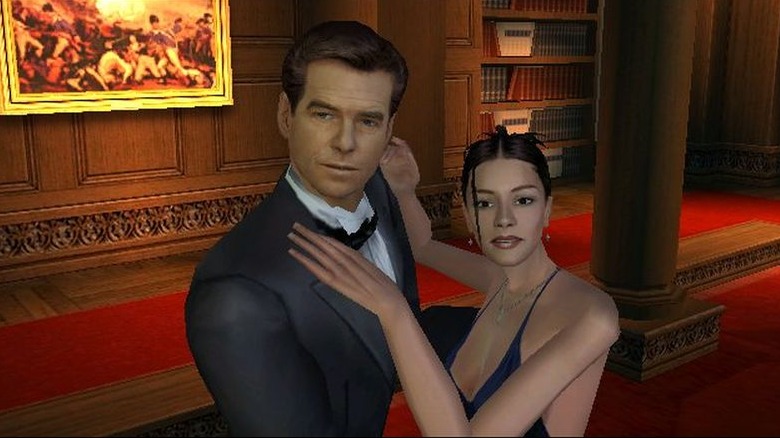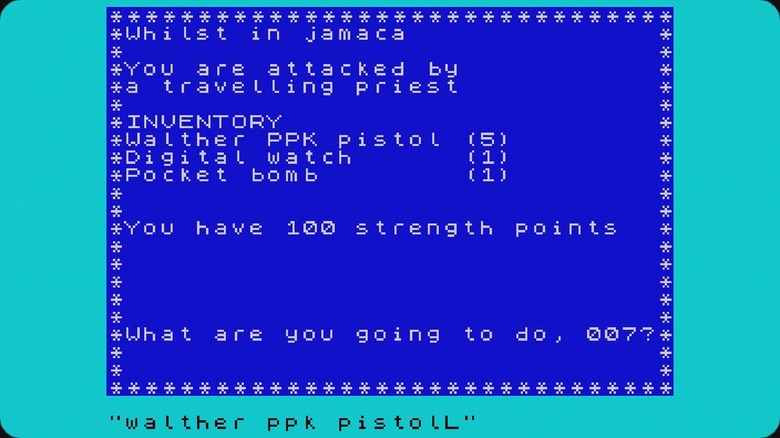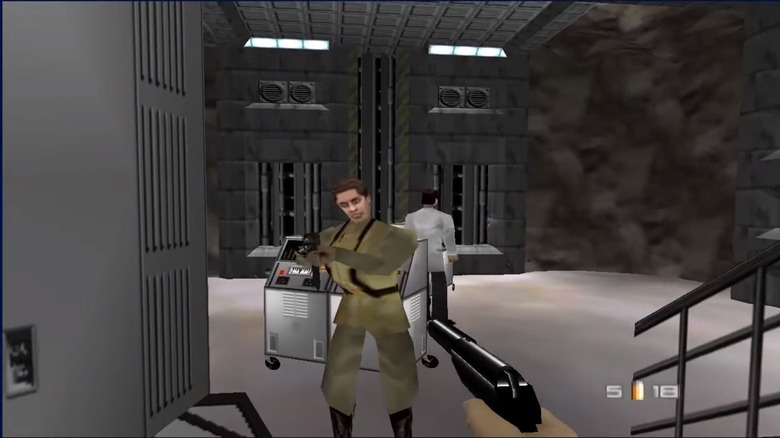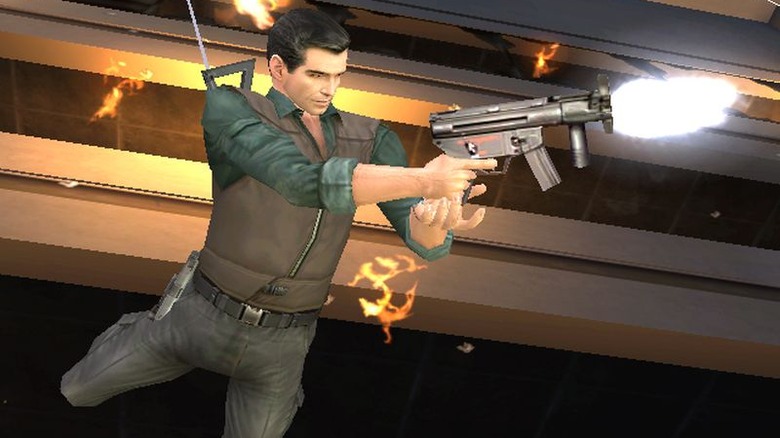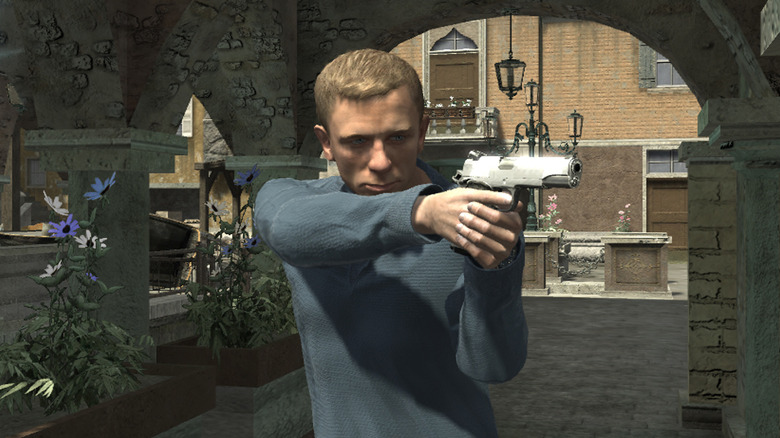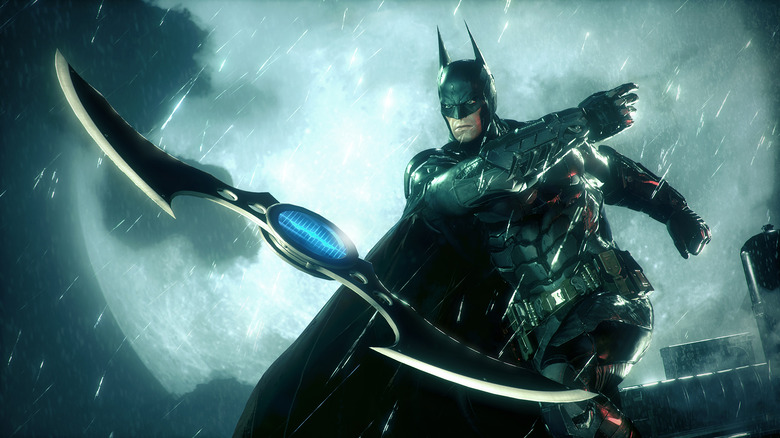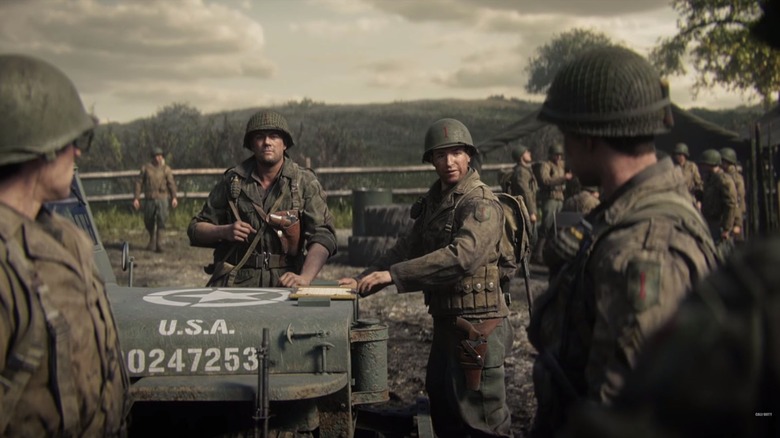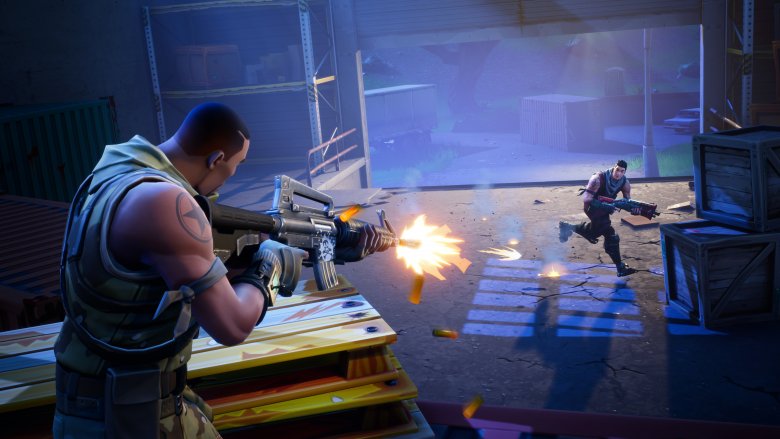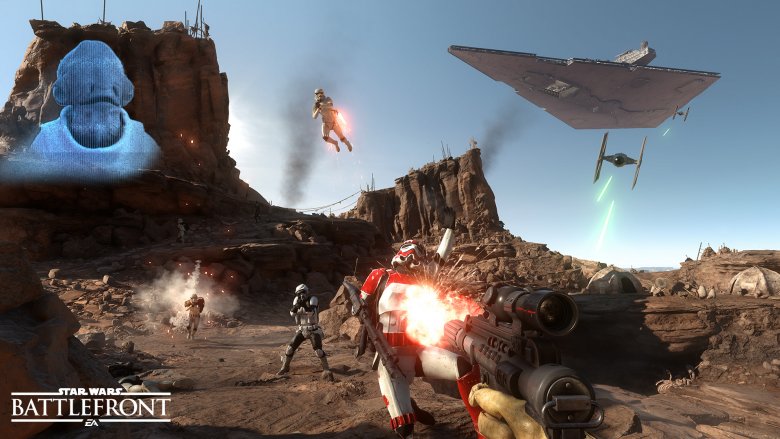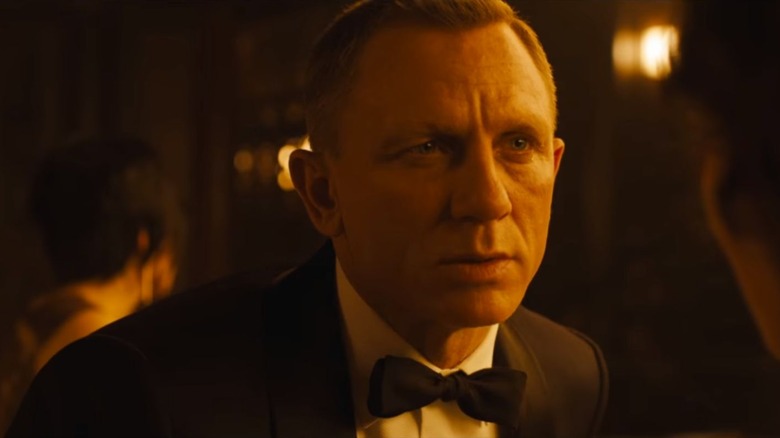Whatever Happened To James Bond Video Games?
It's hard to imagine what console shooters would be like without the influence of one of entertainment's most important franchises: the James Bond 007 series. In 1997, GoldenEye 007 completely changed the way gamers played shooters on consoles, delivering the fast-paced and intense experience that, up until that point, only PC games like Doom could provide. To this day, franchises like Call of Duty, Battlefield, and Halo are still building off of the mechanics GoldenEye 007 popularized over two decades ago.
Fans of the shooter genre are still enjoying the fruit of GoldenEye 007's innovative mechanics — even as that genre shifts to other trends and concepts — to this day, yet the 007 franchise has all but disappeared from the industry. In fact, Bond hasn't been sent on a new video game assignment since 2013. No one even owns the license to make the next James Bond game!
Why isn't Bond a staple of console shooters anymore? To answer that question, we have to track through how the franchise and the industry evolved — and most importantly, the reasons why there's no longer a seat at the table for Bond in the games industry.
The early adventures of James Bond 007
While James Bond 007 is best known as a shooter franchise, it didn't start out that way. In fact, the earliest Bond games released in the '80s explored several different genres. The very first Bond game was Shaken but Not Stirred, a text-based adventure developed and published by the short-lived Richard Shepherd Software in 1982 for the ZX Spectrum. In Shaken but Not Stirred, 007 faces off against the evil Dr. Death, who plans to blow up London with a nuclear warhead. It's up to Bond to solve puzzles in the form of anagrams to find Dr. Death and stop him. This game never received a release outside of the UK.
Most Bond games from the '80s were actually loose adaptations of the era's movies. James Bond 007, developed and published by Parker Brothers for the Commodore 64, ColecoVision, and several Atari systems, introduced the beloved spy to the platform genre in 1983. The game's four levels were based on Diamonds Are Forever, The Spy Who Loved Me, Moonraker, and For Your Eyes Only. It was also the first Bond game to get a worldwide release.
Other early installments from the '80s and '90s include two games based on the Roger Moore adventure, A View to a Kill; a text adventure based on Goldfinger; a Living Daylights platformer; the strange Operation Stealth, which featured Bond working for the CIA; and even an adventure starring Bond's nephew called James Bond Jr.
Then GoldenEye 007 changed console shooters forever
It would've been hard to imagine back in the Nintendo 64 era that James Bond 007 games would ever go out of style, especially after Rare changed the face of console gaming with its own Bond installment based on GoldenEye, Pierce Brosnan's first adventure as 007. There are many who regard 1997's GoldenEye 007 as one of the games responsible for popularizing console shooters and paving the way for franchises like Halo and Call of Duty.
Thanks to its fast-paced, split-screen multiplayer that pit up to four players in several deathmatch modes — a feature that was added in as a bit of an afterthought by Rare — GoldenEye 007 became the second best-selling game on the Nintendo 64 in North America, with 8 million copies sold. GamePro even ranked GoldenEye 007 as the ninth most important video game of all time for its game-changing multiplayer mode.
Unfortunately, Rare never got a shot at another Bond game after it was acquired by Microsoft in 2002. It was up to other studios and publishers to build on GoldenEye 007's massive success.
The EA era of Bond games was the most fruitful
When Electronic Arts took over the 007 license in 1999, it set out to create a whole lineup of Bond games, both based on the films and wholly original. The publisher's first offering was 1999's Tomorrow Never Dies, based on the film of the same name. Originally conceived as a "continuation" of the events of the movie, Tomorrow Never Dies differed from GoldenEye 007 in two major ways: it was a third-person shooter and featured no multiplayer mode.
EA followed up Tomorrow Never Dies with 2000's The World Is Not Enough, a first-person shooter which followed the formula GoldenEye 007 set for the series more closely, although some critics felt that the multiplayer component didn't quite measure up to its predecessor's success.
The company also produced three games with original stories between 2001 and 2003: Agent Under Fire, Nightfire, and Everything or Nothing. These games weren't based on any of the movies, and with the exception of Agent Under Fire, featured Pierce Brosnan's likeness. Everything or Nothing was lauded as "one of the most compelling and faithful Bond games ever created." It was the high point of EA's Bond offerings, which ended with the 2005 third-person shooter based on From Russia with Love.
The Activision years might have killed the franchise
Activision took over the license from EA in 2006. The publisher gave Treyarch, a studio that had earned its shooter stripes with two Call of Duty games, the task of making a video game tie-in for Quantum of Solace. The game was developed using the Call of Duty 4 engine and featured many of the standard CoD conventions, such as quicktime events. But Treyarch also added a cover system that was criticized by some for slowing down the pace of the shooting. Activision's first outing, which also featured levels inspired by Casino Royale, wasn't well received by critics but sold well.
The publisher produced three more Bond games, including Blood Stone, a third-person shooter penned by GoldenEye screenwriter Bruce Feirstein; a port of the GoldenEye 007 Wii remake for PS3 and Xbox 360; and 007 Legends, a compilation game that featured stories from six Bond films. None of these games were received particularly well by critics and 007 Legends in particular also sold poorly.
Such poor sales and the mediocre reception seem to have tarnished the Bond franchise. Activision dropped the 007 license in 2013 and no one has picked up since.
AAA licensed games have died out for the most part
007 Legends' poor sales may not just have been due to the quality of the game but also indicative of how the industry was changing. There was a time when every major Hollywood blockbuster franchise would spawn a tie-in game or two, but over the years, licensed games have earned a reputation as low-quality cash grabs. Consumers have stopped buying licensed titles, resulting in the death of this particular sector of the games industry — and publishers aren't interested in making products that won't make them a profit.
With the exception of the Batman: Arkham series, the recent Star Wars games, the line of Telltale adventure games, and LEGO titles, there aren't many big licensed games on the AAA market anymore. Activision reduced its lineup of licensed titles significantly after giving up on Bond in 2013, citing that it was "consistently working to align its costs with its revenues." In other words, Activision decided to focus on games that had more profit potential.
EA explained in 2011 that the days of licensed games "are dead like the dinosaur" and that "the movie-game business is falling apart." Of course, EA has since picked up the Star Wars license from Disney and is currently developing several games based on the franchise. Regardless, the Bond franchise isn't likely to enjoy the same kind of attention now that it's damaged goods.
Banking on a franchise with a sketchy sales history is a much bigger risk
Publishers have become more risk averse as the cost of making games has continued to rise. Licensed games also come with their own unique challenges, including licensing fees and licensor royalties. Publishers not only have to pay to use the intellectual property in question but also have to share their profits. So if a game doesn't sell well, the publishers basically make nothing off of the licensed property they invested in.
"The percentage royalties you have to pay the licensors are going the wrong way for publishers. The margins are being squeezed," explained former EA Games president Frank Gibeau in 2011.
Gibeau also cited the James Bond franchise specifically as difficult one to work with due to "creative limitations." None of this leaves the 007 franchise in a very good place, especially when its last few installments have either been poorly received or made very little money. It's just not worth the hassle.
Studios are moving away from linear experiences
In the past few years, the industry has begun moving away from linear single-player games. A statement made by Electronic Arts after the cancellation of Visceral Games' untitled Star Wars game has sparked much discussion about whether traditional linear gaming experiences are on their way out in favor of a games-as-a-service approach. EA cited the Star Wars game's "story-based, linear" design as the main reason for the cancellation and the pivot to "a broader experience that allows for more variety and player agency."
At a conference a few weeks after that statement, EA CFO Blake Jorgensen further explained that players don't like linear games as much as they used to. Manveer Heir, a former employee at BioWare, suggested a different reason for the shift in EA's approach: it's easier to monetize open-world live service games. Publishers are able to sell consumers more extra content when the base game is designed to keep people coming back time and again.
On the other hand, linear single-player games have a much shorter lifespan. It might be a reason why franchises that have featured single-player story modes in the past, such as Call of Duty, are reportedly pivoting away from single-player altogether. Linear, story-focused single-player has always been a major component of the Bond franchise, which is yet another reason why studios might be staying away from it.
Traditional multiplayer experiences are shifting to new trends
The industry has also moved away from the deathmatch multiplayer GoldenEye 007 helped popularize on consoles in the late '90s. While other series like Call of Duty, Halo, and Battlefield have continued to build on GoldenEye's deathmatch modes, new multiplayer experiences, like team-based hero shooters Overwatch and Paladins and battle royale behemoths PlayerUnknown's Battlegrounds and Fortnite, have changed the way players shoot at each other online.
There's just no denying the popularity of either of these subgenres. Fortnite has a player base of more than 45 million people. Overwatch has more than 40 million registered players. It's not surprising then that both Call of Duty: Black Ops 4 and Battlefield V will reportedly feature battle royale modes.
Could the 007 franchise adapt in the same way? More importantly, would it matter? While hero shooters and battle royale games may be all the rage, that doesn't mean there are infinite opportunities to capitalize on those trends. Already we've seen games like LawBreakers, a hero shooter, and Radical Heights, a new battle royale title, fail to compete. In both instances, developer Boss Key Productions arrived late to the scene (and paid for it dearly). The argument could be made that, even if 007 could adapt its multiplayer for the modern age, it would be too late to the party.
There's just not much room in the shooter genre anymore
Forget the fact that major publishers are less interested in single-player games and are rushing to cash in on the battle royale craze. The biggest obstacle a new Bond title would face is the sheer number of shooters currently on the market. Call of Duty, Battlefield, Overwatch, Battlefront, Halo, PUBG, Fortnite, and Rainbow Six: Siege are currently fighting for shooter supremacy, with not much room for Bond.
Even when there were still Bond games on shelves, the franchise was losing out bad to its contemporaries. In 2013, 007 Legends bombed, while Call of Duty: Ghosts, released the same year, sold 19 million units. With even fiercer competition, those numbers don't really inspire much confidence in the 007 franchise.
There are only so many people on the planet, which means that there only so many games that can share the wealth. So much time has passed since the last 007 installment that it might not even matter if the series makes a comeback.
An inevitable transition in the film franchise might be halting another game
Uncertainty surrounding the Bond film series might also be contributing to the lack of modern 007 games. Until recently, the films were in limbo after the tepid response to Spectre, the latest installment, and the uncertainty regarding Daniel Craig's return to the role. In fact, after shooting Spectre, Craig told The Guardian that he'd rather slash his own wrists than make another Bond movie, and that if he ever made another one, it'd be for the money. Either way, the next Bond film will be Craig's final appearance as the secret agent.
Bond 25, which is set for a 2019 release, hasn't nailed down a director, either. Danny Boyle, the filmmaker behind 28 Days Later and Trainspotting, is working on a script for the film but he's not been confirmed as director of the new Bond.
With so many things up in the air on the movie side, MGM might not be willing to also deal with a new video game, especially if there's potential for it to fail or receive negative publicity. The studio may hold off on licensing new Bond games until after the film series has figured itself out.

